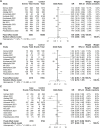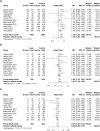IFITM3, FURIN, ACE1, and TNF-α Genetic Association With COVID-19 Outcomes: Systematic Review and Meta-Analysis
- PMID: 35432458
- PMCID: PMC9010674
- DOI: 10.3389/fgene.2022.775246
IFITM3, FURIN, ACE1, and TNF-α Genetic Association With COVID-19 Outcomes: Systematic Review and Meta-Analysis
Abstract
Human polymorphisms may contribute to SARS-CoV-2 infection susceptibility and COVID-19 outcomes (asymptomatic presentation, severe COVID-19, death). We aimed to evaluate the association of IFITM3, FURIN, ACE1, and TNF-α genetic variants with both phenotypes using meta-analysis. The bibliographic search was conducted on the PubMed and Scielo databases covering reports published until February 8, 2022. Two independent researchers examined the study quality using the Q-Genie tool. Using the Mantel-Haenszel weighted means method, odds ratios were combined under both fixed- and random-effect models. Twenty-seven studies were included in the systematic review (five with IFITM3, two with Furin, three with TNF-α, and 17 with ACE1) and 22 in the meta-analysis (IFITM3 n = 3, TNF-α, and ACE1 n = 16). Meta-analysis indicated no association of 1) ACE1 rs4646994 and susceptibility, 2) ACE1 rs4646994 and asymptomatic COVID-19, 3) IFITM3 rs12252 and ICU hospitalization, and 4) TNF-α rs1800629 and death. On the other hand, significant results were found for ACE1 rs4646994 association with COVID-19 severity (11 studies, 692 severe cases, and 1,433 nonsevere controls). The ACE1 rs4646994 deletion allele showed increased odds for severe manifestation (OR: 1.45; 95% CI: 1.26-1.66). The homozygous deletion was a risk factor (OR: 1.49, 95% CI: 1.22-1.83), while homozygous insertion presented a protective effect (OR: 0.57, 95% CI: 0.45-0.74). Further reports are needed to verify this effect on populations with different ethnic backgrounds. Systematic Review Registration: https://www.crd.york.ac.uk/prosperodisplay_record.php?ID=CRD42021268578, identifier CRD42021268578.
Keywords: biomarkers; candidate genes; genetic association study; host genetics; polymorphism; transposable elements.
Copyright © 2022 de Araújo, Menezes, Aguiar and Souza.
Conflict of interest statement
The authors declare that the research was conducted in the absence of any commercial or financial relationships that could be construed as a potential conflict of interest.
Figures






Similar articles
-
The association of ACE1, ACE2, TMPRSS2, IFITM3 and VDR polymorphisms with COVID-19 severity: A systematic review and meta-analysis.EXCLI J. 2022 Jun 20;21:818-839. doi: 10.17179/excli2022-4976. eCollection 2022. EXCLI J. 2022. PMID: 35949487 Free PMC article. Review.
-
Strong Association of Angiotensin Converting Enzyme-2 Gene Insertion/Deletion Polymorphism with Susceptibility to SARS-CoV-2, Hypertension, Coronary Artery Disease and COVID-19 Disease Mortality.J Pers Med. 2021 Oct 27;11(11):1098. doi: 10.3390/jpm11111098. J Pers Med. 2021. PMID: 34834450 Free PMC article.
-
Association between IFITM3 rs12252 polymorphism and influenza susceptibility and severity: A meta-analysis.Gene. 2018 Oct 20;674:70-79. doi: 10.1016/j.gene.2018.06.070. Epub 2018 Jun 22. Gene. 2018. PMID: 29940276
-
IFITM3 rs12252 polymorphism and coronavirus disease 2019 severity: A meta‑analysis.Exp Ther Med. 2023 Feb 21;25(4):158. doi: 10.3892/etm.2023.11857. eCollection 2023 Apr. Exp Ther Med. 2023. PMID: 36911378 Free PMC article.
-
Angiotensin-Converting Enzyme (ACE) 1 Gene Polymorphism and Phenotypic Expression of COVID-19 Symptoms.Genes (Basel). 2021 Oct 1;12(10):1572. doi: 10.3390/genes12101572. Genes (Basel). 2021. PMID: 34680966 Free PMC article. Review.
Cited by
-
The role of ACE1 I/D and ACE2 polymorphism in the outcome of Iranian COVID-19 patients: A case-control study.Front Genet. 2022 Sep 5;13:955965. doi: 10.3389/fgene.2022.955965. eCollection 2022. Front Genet. 2022. PMID: 36134024 Free PMC article.
-
Functional consequences of SARS-CoV-2 infection in pregnant women, fetoplacental unit, and neonate.Biochim Biophys Acta Mol Basis Dis. 2023 Jan 1;1869(1):166582. doi: 10.1016/j.bbadis.2022.166582. Epub 2022 Oct 20. Biochim Biophys Acta Mol Basis Dis. 2023. PMID: 36273675 Free PMC article. Review.
-
The first assessment of Angiotensin-Converting Enzyme 1 (ACE1) D/I polymorphism and demographic factors in association with COVID-19 outcomes in the Moroccan Population.Mol Biol Rep. 2025 Jan 8;52(1):109. doi: 10.1007/s11033-024-10211-6. Mol Biol Rep. 2025. PMID: 39775335
-
High nasopharyngeal and serum IL-6 levels and the - 573G > C polymorphism (rs1800796) are linked with the risk of severe COVID-19 in a Mexican population: a case‒control study.BMC Infect Dis. 2025 Mar 5;25(1):315. doi: 10.1186/s12879-025-10695-y. BMC Infect Dis. 2025. PMID: 40045221 Free PMC article.
-
Systematic review and meta-analysis of human genetic variants contributing to COVID-19 susceptibility and severity.Gene. 2022 Nov 30;844:146790. doi: 10.1016/j.gene.2022.146790. Epub 2022 Aug 17. Gene. 2022. PMID: 35987511 Free PMC article.
References
-
- Annunziata A., Coppola A., di Spirito V., Cauteruccio R., Marotta A., Micco P. D., et al. (2021). The Angiotensin Converting Enzyme Deletion/Deletion Genotype Is a Risk Factor for Severe COVID-19: Implication and Utility for Patients Admitted to Emergency Department. Medicina 57, 844. 10.3390/medicina57080844 - DOI - PMC - PubMed
Publication types
LinkOut - more resources
Full Text Sources
Miscellaneous

